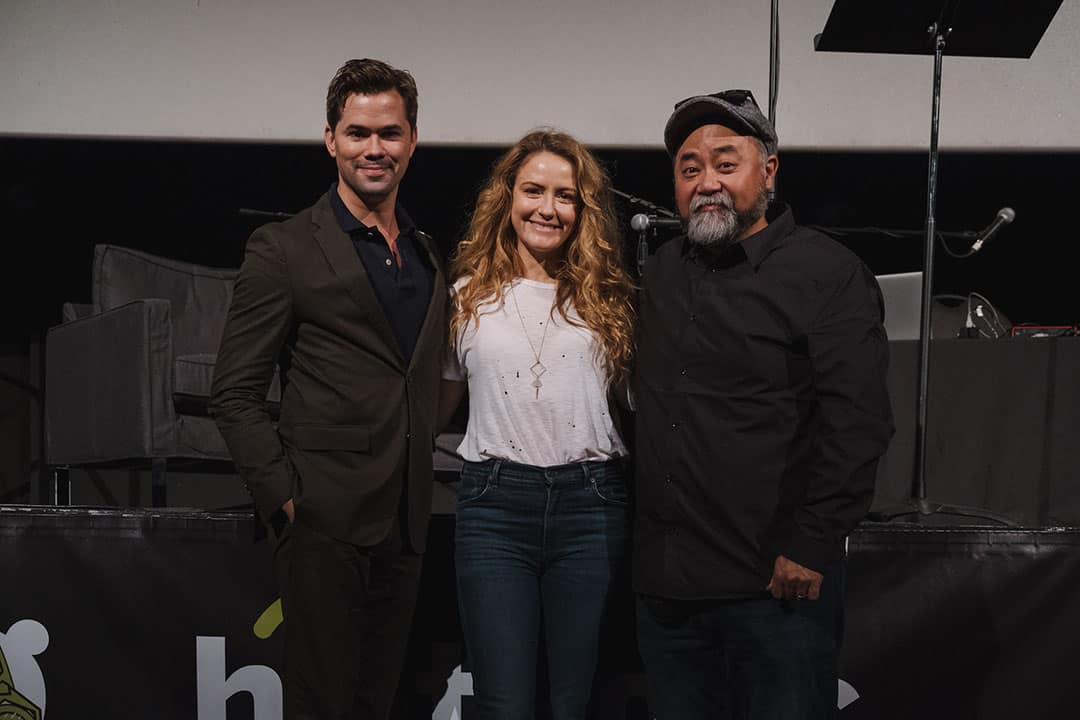A woman who’s in the best relationship of her life, only to discover she’s been taken for a ride by a Craigslist conman. A husband’s “birth plan” that goes disregarded when his wife goes into labour prematurely. A young man who ignores his ringing cellphone in favour of hooking up with a stranger, only to wake up to an inbox full of voicemails informing him that his father has slipped into a coma.
All these are pieces from the archives of The New York Times’ “Modern Love” column, a fixture in the paper’s Sunday edition since October 2004. These were also the three pieces presented by its audible counterpart Modern Love: The Podcast at this year’s Hot Docs Podcast Festival.
The festival, held at the Hot Docs Ted Rogers Cinema, featured live performances from a number of podcasts, including other fan favourites like Grownups Read Things They Wrote As Kids and The Nod, along with Q&As and panel discussions with the people behind them. While Modern Love’s title may imply a focus on romantic love, the personal essays that appear both in the column and on the podcast are actually more loosely organized around the theme of “being a person.”
“I think Modern Love is really a way to further your education about what it means to be a human being,” said podcast producer Amory Sivertson in an interview with The Varsity. “No matter who we are or where we come from, or what our circumstances are, we all have a deep relationship of some sort … These stories are universal.”
Sivertson was joined on the Hot Docs stage by executive producer Iris Adler, sound designer John Perotti, and the column’s editor, Daniel Jones, to talk about the podcast’s production. As much as the stories themselves speak to the love and loss we all face in ordinary life, the voices that bring them to life are not quite average: the podcast has featured prolific talents such as Colin Farrell, Judd Apatow, and Jake Gyllenhaal.
The Toronto panel was interspersed with performances and boasted a two-thirds Canadian cast: Murdoch Mysteries’ Hélène Joy, Kim’s Convenience’s Paul Sun-Hyung Lee, and Girls star Andrew Rannells, reading his own essay for the column.
The simplicity of the podcast’s concept —’actor reads essay’ — belies the amount of work that goes into each episode. The difficulty of transmuting written pieces into engaging audio was a topic that came up repeatedly during the discussion: from the selection of essays to finding actors that suit them to nailing the sound design. Production is a painstaking process.
And yet Modern Love: The Podcast never feels clichéd, trite, or melodramatic; it is clever, poignant, and intimate. Sometimes it makes you laugh; sometimes it makes you feel like someone has taken a jackhammer to your heart. All of which is to say, it is very good.
If you don’t trust me, trust its popularity: in its first month alone, the podcast saw over 1.4 million downloads. “I’m afraid the podcast is better than the column,” joked Jones at the event.
He’s not wrong to be a bit concerned. As lovely as the column is, “Modern Love”’s audio incarnation is truly spellbinding. Much of this can be chalked up to the sound design.
The challenge, Perotti explained, is using sound to create a mood which best captures the story. Sometimes music is a tool to bring more energy to a scene when monologue alone falls short; sometimes it’s used to “tamp down” the drama when it borders on being too much.
That kind of attention to detail — which has entailed researching exactly how Andrew Rannells’ Nokia cell ringtone sounded, recording background noise from a specific location, digging through sound banks to find just the right sound— seeps into every aspect of the podcast’s production, to the point that the writers of the original pieces are also contacted and interviewed for each episode to get their take on the stories and to find out how their lives have changed since they took place.
“Hearing something out loud is so different from reading something on a page,” said Sivertson. “I see this as really breathing a different kind of life into these pieces by giving an actual voice to them.”
As the column continues to receive a bottomless pit of submissions – over 8,000 a year for 52 slots, according to Jones – there is no shortage of eligible stories for them to tell. Some of the newer additions to the column focus on issues that were formerly taboo, for example, relationships in the transgender community, which has opened up these topics to the podcast as well.
“We want to have a diverse range of voices, and tell a diverse range of stories,” said Sivertson. “I feel like sometimes the only thing that we can agree on is that there’s nothing more powerful than loving and being loved.”
— With files from Reut Cohen


